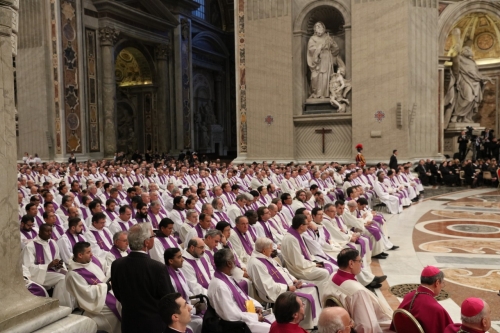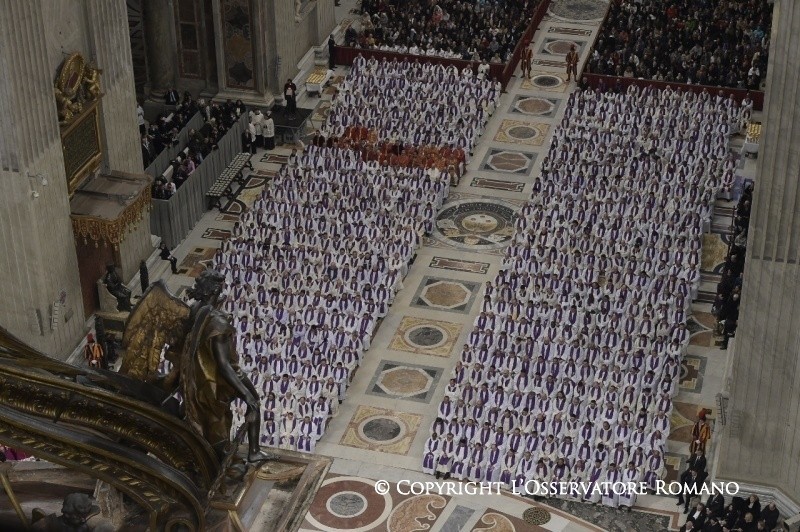HOMILY OF HIS HOLINESS POPE FRANCIS
Vatican Basilica
Ash Wednesday, 10 February 2016
The Word of God, at the start of the Lenten journey, addresses two invitations to the Church and to each of us.
The first is that of St Paul: “be reconciled to God” (2 Cor 5:20). It is not simply good fatherly advice, neither is it just a suggestion; it is a bona fide supplication on Christ’s behalf: “We beseech you on behalf of Christ, be reconciled to God” (ibid.). Why does he make such a solemn and earnest appeal? Because Christ knows how fragile and sinful we are, he knows the weakness of our heart. He immediately sees it wounded by the evil we have committed. He knows how much we need forgiveness, he knows that it is important for us to feel loved in order to do good. We cannot do it alone: this is why the Apostle does not tell us to do something but to allow ourselves to be reconciled with God, to let him forgive us, with trust, because “God is greater than our hearts” (1 Jn 3:20). He conquers sin and lifts us out of misery, if we let him. It is up to us to acknowledge that we need mercy. This is the first step on the Christian path; it entails entering through the open door which is Christ, where he, the Saviour, awaits us and offers us a new and joyful life.
There may be a few obstacles, which close the door of the heart. There is the temptation to lock the doors, or to live with our sin, minimizing it, always justifying it, thinking we are no worse than others; this, however, is how the locks of the soul are closed and we remain shut inside, prisoners of evil. Another obstacle is the shame of opening the secret door of the heart. Shame, in reality, is a good symptom, because it shows that we want to break away from evil; however, it must never be transformed into apprehension or fear. There is a third pitfall, that of distancing ourselves from the door: it happens when we hide in our misery, when we ruminate constantly, connecting it to negative things, until sinking into the darkest repositories of the soul. Then we even become kindred with the sorrow that we do not want, we become discouraged and we are weaker in the face of temptations. This happens because we bide alone with ourselves, closing ourselves off and avoiding the light; while the Lord’s grace alone frees us. Therefore let us be reconciled, let us listen to Jesus who says to those who are weary and oppressed: “Come to me” (Mt 11:28). Not to dwell within themselves, but to go to him! Comfort and peace are there.
At this celebration the Missionaries of Mercy are present, to receive the mandate to be signs and instruments of God’s forgiveness. Dear brothers, may you help to open the doors of hearts, to overcome shame, not to avoid the light. May your hands bless and lift up brothers and sisters with paternity; through you may the gaze and the hands of God rest on his children and heal them of their wounds!
There is a second invitation of God, who says, through the prophet Joel: “return to me with all your heart” (2:12). If we need to return it is because we have distanced ourselves. It is the mystery of sin: we have distanced ourselves from God, from others, from ourselves. It is not difficult to realize this: we all see how we struggle to truly trust in God, to entrust ourselves to him as Father, without fear; as it is challenging to love others, rather than thinking badly of them; how it costs us to do our true good, while we are attracted and seduced by so many material realities, which disappear and in the end leave us impoverished. Alongside this history of sin, Jesus inaugurated a history of salvation. The Gospel which opens Lent calls us to be protagonists, embracing three remedies, three medicines which heal us from sin (cf. Mt 6:1-6, 16-18).
In the first place is prayer, an expression of openness and trust in the Lord: it is the personal encounter with him, which shortens the distances created by sin. Praying means saying: “I am not self-sufficient, I need You, You are my life and my salvation”. In the second place is charity, in order to overcome our lack of involvement with regard to others. True love, in fact, is not an outward act, it is not giving something in a paternalistic way in order to assuage the conscience, but to accept those who are in need of our time, our friendship, our help. It means living to serve, overcoming the temptation to satisfy ourselves. In the third place isfasting, penance, in order to free ourselves from dependencies regarding what is passing, and to train ourselves to be more sensitive and merciful. It is an invitation to simplicity and to sharing: to take something from our table and from our assets in order to once again find the true benefit of freedom.
“Return to me” — says the Lord — “return with all your heart”: not only with a few outward deeds, but from the depths of our selves. Indeed, Jesus calls us to live prayer, charity and penance with consistency and authenticity, overcoming hypocrisy. May Lent be a beneficial time to “prune” falseness, worldliness, indifference: so as not to think that everything is fine if I am fine; so as to understand that what counts is not approval, the search for success or consensus, but the cleansing of the heart and of life; so as to find again our Christian identity, namely, the love that serves, not the selfishness that serves us. Let us embark on the journey together, as Church, by receiving Ashes — we too will become ashes — and keeping our gaze fixed on the Crucifix. He, loving us, invites us to be reconciled with God and to return to him, in order to find ourselves again.








.jpeg/_jcr_content/renditions/cq5dam.thumbnail.140.100.png)
.jpeg/_jcr_content/renditions/cq5dam.thumbnail.140.100.png)
.jpeg/_jcr_content/renditions/cq5dam.thumbnail.140.100.png)
.jpeg/_jcr_content/renditions/cq5dam.thumbnail.140.100.png)
.jpeg/_jcr_content/renditions/cq5dam.thumbnail.140.100.png)
.jpeg/_jcr_content/renditions/cq5dam.thumbnail.140.100.png)
.jpeg/_jcr_content/renditions/cq5dam.thumbnail.140.100.png)
.jpeg/_jcr_content/renditions/cq5dam.thumbnail.140.100.png)
.jpeg/_jcr_content/renditions/cq5dam.thumbnail.140.100.png)
.jpeg/_jcr_content/renditions/cq5dam.thumbnail.140.100.png)
.jpeg/_jcr_content/renditions/cq5dam.thumbnail.140.100.png)
.jpeg/_jcr_content/renditions/cq5dam.thumbnail.140.100.png)
.jpeg/_jcr_content/renditions/cq5dam.thumbnail.140.100.png)
.jpeg/_jcr_content/renditions/cq5dam.thumbnail.140.100.png)
.jpeg/_jcr_content/renditions/cq5dam.thumbnail.140.100.png)
.jpeg/_jcr_content/renditions/cq5dam.thumbnail.140.100.png)
.jpeg/_jcr_content/renditions/cq5dam.thumbnail.140.100.png)
.jpeg/_jcr_content/renditions/cq5dam.thumbnail.140.100.png)
.jpeg/_jcr_content/renditions/cq5dam.thumbnail.140.100.png)
.jpeg/_jcr_content/renditions/cq5dam.thumbnail.140.100.png)

.jpeg/_jcr_content/renditions/cq5dam.thumbnail.140.100.png)
.jpeg/_jcr_content/renditions/cq5dam.thumbnail.140.100.png)
.jpeg/_jcr_content/renditions/cq5dam.thumbnail.140.100.png)
.jpeg/_jcr_content/renditions/cq5dam.thumbnail.140.100.png)
.jpeg/_jcr_content/renditions/cq5dam.thumbnail.140.100.png)




















.jpg/_jcr_content/renditions/cq5dam.thumbnail.140.100.png)
